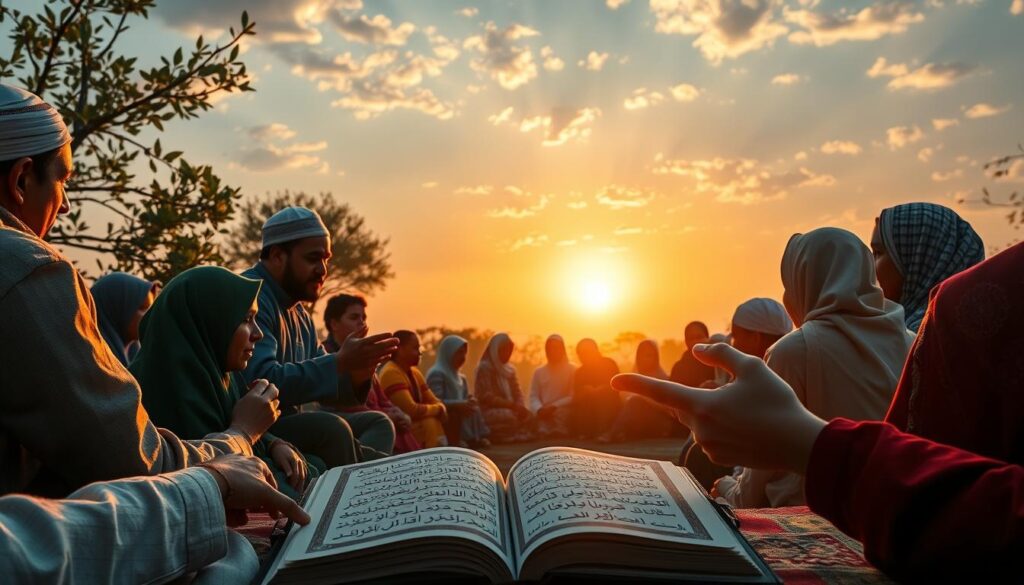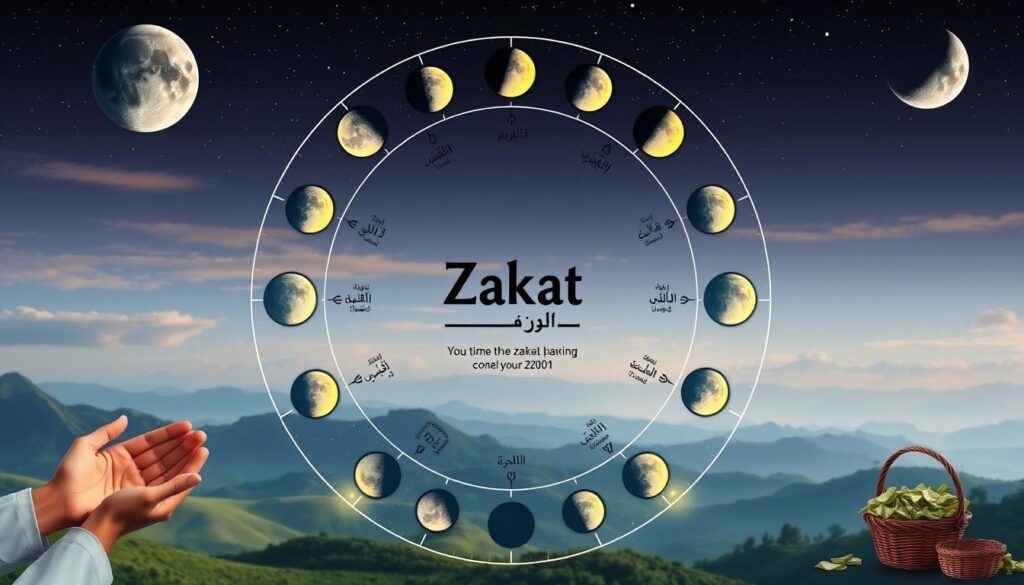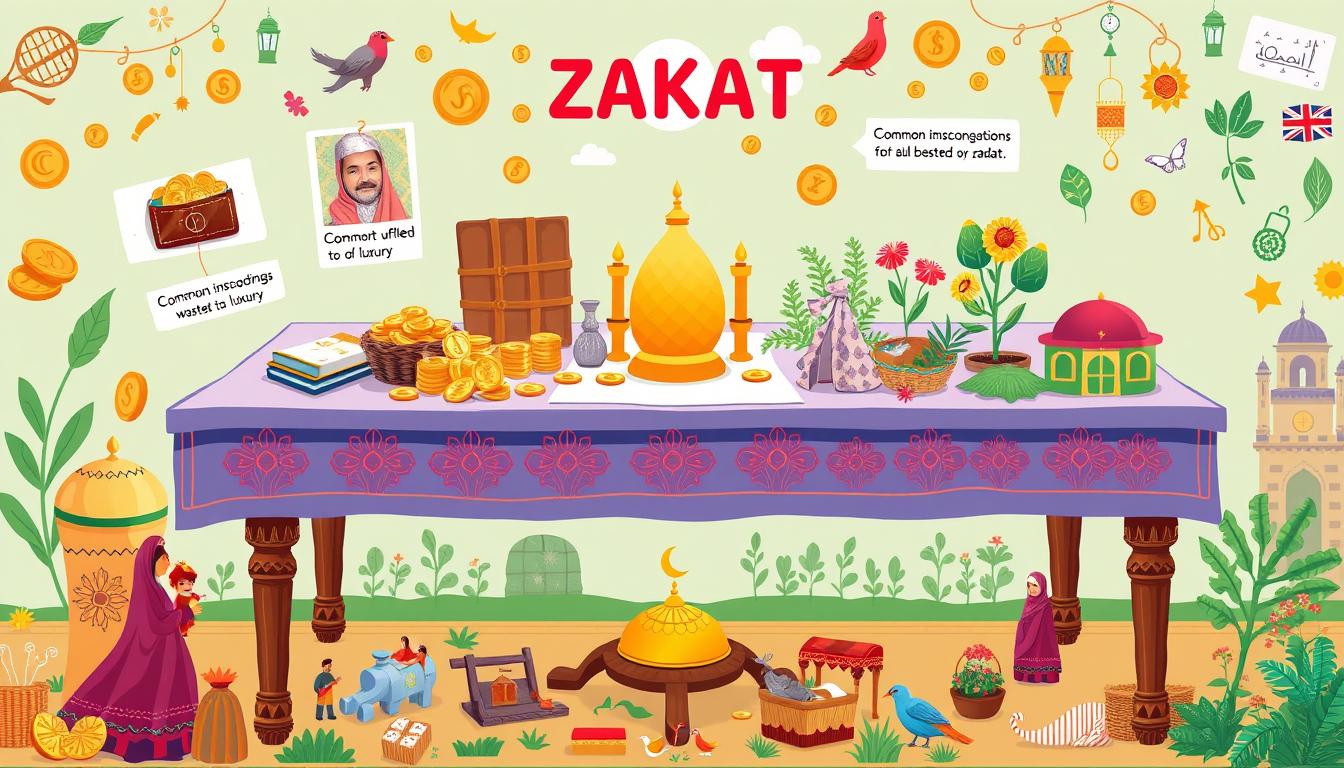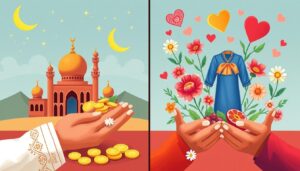Did you know over 155,000 angels and 50,000 VCs worldwide are ready to help? Yet, many Muslims face Zakat misconceptions. At Umar Khan Charity Organization, we believe Zakat can change lives and communities. Understanding Zakat is key to making a difference.
Exploring Zakat, we must tackle common myths and misconceptions. These misunderstandings can stop people from participating. Our goal is to clear these up and show Zakat’s importance in supporting various causes.
Umar Khan Charity Organization aims to change lives through faith-based work. Zakat is vital for social justice, equality, and compassion. Together, we can build a fair society, free from Zakat misconceptions.
Key Takeaways
- Zakat is one of the five pillars of Islam and is considered a religious obligation by most Muslims.
- Misunderstandings about Zakat can lead to a lack of understanding and participation.
- Common myths about Zakat include the idea that it is only for the wealthy or that it is a tax.
- Zakat can be used to support various causes, including poverty alleviation, education, and healthcare.
- Umar Khan Charity Organization is committed to promoting Zakat awareness and supporting vulnerable communities through Zakat contributions.
- Zakat misconceptions can be addressed through education and awareness, leading to a greater understanding and participation in this vital aspect of Islamic charitable work.
- By working together, we can create a more just and equitable society, free from the misconceptions and misunderstandings that often surround Zakat.
Understanding the Basics of Zakat
Knowing the basics of Zakat is key to doing it right. By debunking Zakat myths and Zakat confusion, we follow Islamic teachings better. Zakat is a way to purify wealth and soul, and it’s a pillar of Islam.
Zakat is given on assets like cash, gold, silver, and business assets. The Nisab threshold is about 87.48 grams of gold or 612.36 grams of silver. To figure out Zakat, we calculate our net wealth after subtracting debts.
There are specific groups that Zakat helps, including:
- The poor and needy
- Those in bondage or debt
- Those in the cause of Allah
- The wayfarer
Knowing these groups helps us give Zakat where it’s most needed. This way, we can help those in need and avoid Zakat misinterpretations.
By grasping Zakat’s basics and dispelling Zakat myths and Zakat confusion, we aim for a fairer society. Let’s work together to positively impact our communities through Zakat.
| Category | Description |
|---|---|
| Poor and needy | Individuals who lack the means to support themselves |
| Those in bondage or debt | Individuals who are struggling to pay off debts or are enslaved |
| Those in the cause of Allah | Individuals who are working to promote Islam and support the Muslim community |
Common Misunderstandings About Zakat
We often see mistakes in understanding Zakat, which is a key part of Islamic faith. It’s important to clear up these misunderstandings. This way, Zakat can be practiced correctly and effectively.
Many think Zakat is just a tax. But Zakat is more than that. It’s a way for Muslims to give to charity and purify their wealth and soul.
Zakat is Not Just for the Wealthy
Another mistake is thinking only the rich have to pay Zakat. While it’s true that Zakat is for those with a lot of wealth, it’s not only for them. Anyone with a certain amount of wealth, called Nisab, must pay Zakat.
Some important things to remember about Zakat include:
- Zakat is 2.5% of a Muslim’s assets and savings
- Zakat can be due at any time, not just in Ramadan
- Zakat applies to various wealth, like gold, silver, jewelry, cash, and business stock

By addressing these common misunderstandings, we can make sure Zakat is practiced right. This way, its benefits are fully realized. Let’s work together to understand Zakat better and its role in Islamic faith.
| Category | Zakat Rate |
|---|---|
| Gold and Silver | 2.5% |
| Cash and Business Stock | 2.5% |
| Agricultural Produce | 5-10% |
The Calculation of Zakat
Calculating Zakat can seem complex, leading to many Zakat misconceptions. It’s key to understand the basics to practice Zakat correctly. Zakat is 2.5% of what you have more than you need each year. This includes gold, silver, cash, stocks, and business goods.
Many make mistakes in Zakat, like not counting all assets or using net income instead of total assets. Not considering debts is another error. Also, using old values for gold and silver can be wrong.
To clear up Common myths about Zakat, we must calculate it right and pay on time. The Nisab, or the minimum to give, is 87.48 grams of gold or 612.36 grams of silver. Knowing these rules helps us meet our Zakat duty and help our community.
- Include all eligible assets in Zakat calculation, such as gold, silver, investments, and business goods.
- Calculate Zakat on total assets, not net income.
- Account for debts in Zakat calculation to ensure accurate figures.
- Use the current market values of gold and silver to determine the Nisab threshold.
By following these tips and avoiding common errors, we can make sure our Zakat helps those in need.
Misconceptions Around Zakat Recipients
Many people have Zakat myths and confusion about who can get Zakat. It’s key to know the rules for who can receive it. This helps us see how Zakat is different from other kinds of donations.
The Quran says Zakat can go to eight groups, like the poor and those in debt. These groups are chosen by God. Zakat is meant to help the needy and support those in need.
Who Can Receive Zakat?
The Quran, in Surah Tawbah 9:60, lists who can get Zakat. Some examples are:
- The poor
- The destitute
- Those in debt
- Those whose hearts are to be reconciled
- Captives
- Debtors
- Those in the cause of God
- Wayfarers
It’s important to make sure Zakat goes to the right people, when they need it most. Online tools help make giving Zakat easier. They make sure it reaches those who need it most.
Zakat vs. Other Charitable Donations
Zakat is different from other donations because of its specific rules and who it helps. Knowing these rules helps Zakat reach those who need it most. This clears up common myths and confusion about Zakat.
Timing and Frequency of Zakat Payments
We know that Common errors in Zakat understanding can cause confusion. To Clearing up Zakat misunderstandings, Zakat is an annual duty. It must be paid after a full year from when you reach the Zakat threshold.
When Should Zakat Be Paid?
Zakat is paid once a year. The exact time depends on your wealth type. For example, if you have crops, Zakat is due at harvest. Livestock Zakat is paid when the animals are a year old. For more details, check Zakat.org.
Is Zakat an Annual Obligation?
Yes, Zakat is an annual duty. The payment schedule varies by wealth type. Zakat is 2.5% of your total wealth, including savings and investments. Knowing when to pay Zakat helps us meet our duty and help others.
For more on Zakat, including when to pay, visit Zakat.org. Together, we can Clearing up Zakat misunderstandings and practice it right.

The Impact of Zakat on Society
We need to clear up Zakat misconceptions and Common myths about Zakat to see its real impact. This helps us build a fairer community. Zakat encourages giving, faith, and helping others.
Zakat helps the economy, which fights problems like illiteracy and crime. It also makes us more generous and helps us grow as individuals. Together, we can build a better society.
Some key benefits of Zakat for communities are:
- Promoting economic stability and growth
- Combating poverty and social issues
- Encouraging generosity and self-purification
- Building an ideal community through individual character-building and positive social change
Understanding Zakat’s positive effects helps us strive for a fairer society. We can overcome Zakat misconceptions and Common myths about Zakat by spreading its true spirit. Let’s work together to make a difference.
| Benefits of Zakat | Individual Impacts | Collective Impacts |
|---|---|---|
| Promoting economic stability and growth | Promoting generosity and self-purification | Building an ideal community |
| Combating poverty and social issues | Encouraging obedience to the law | Positive social change |
Zakat and Modern Financial Systems
Zakat myths and confusion can happen when we mix Islamic giving with today’s finance. We need to figure out how to do Zakat right in our complex world.
In the past, Zakat helped a lot with poverty. Now, we have things like futures and real estate trusts. Central banks control money, affecting Zakat.
Important things to think about include:
- Digital platforms for Zakat payment, making it clearer and faster
- Being open about where Zakat money goes, to build trust
- How laws and finance have changed, affecting Zakat
By tackling these issues, we can make Zakat more effective in today’s finance.
The Role of Organizations Like Umar Khan Charity
We know that Common errors in Zakat understanding can make Zakat less effective. Organizations like Umar Khan Charity help a lot. They work to Clear up Zakat misunderstandings and help with Zakat giving.
We teach donors how to give Zakat right. We make sure their money goes to those who really need it. Together, we aim for a fairer world, without Common errors in Zakat understanding.
How We Facilitate Zakat Giving
Our group helps donors give Zakat with confidence. They know it helps good causes. We aim to Clear up Zakat misunderstandings and be open about how we work.
Success Stories from Our Initiatives
We’ve helped many people and communities. By Clearing up Zakat misunderstandings and fixing Common errors in Zakat understanding, we keep working. Our goal is a brighter future for everyone.
Getting Involved with Umar Khan Charity
At Umar Khan Charity, we think that together, we can make a better world. We aim to bring justice and fairness to everyone, showing the true meaning of Zakat. As we finish talking about common
Zakat misconceptions
and
myths
, we invite you to join our cause.
There are many ways to help us. You can give Zakat or other donations online, helping us help those in need. You can also volunteer your time and skills. This could be helping with projects, spreading the word, or fighting for the rights of the vulnerable.
To start, just visit our website at UmarKhanCharity.org or follow us on social media @UmarKhanCharity. Our team is ready to help you and answer any questions. Let’s work together to use Zakat’s power to make a better future for everyone.
FAQ
What is the definition and importance of Zakat?
What is the historical background of Zakat?
Who is obligated to pay Zakat?
Is Zakat just a tax, or do only wealthy individuals have to pay it?
How do I calculate my Zakat correctly?
Who can receive Zakat, and how does it differ from other charitable donations?
When should Zakat be paid, and is it an annual obligation?
What is the impact of Zakat on society, and can you provide examples?
How can Zakat be integrated into modern financial systems, and what role do digital platforms play?
How can organizations like Umar Khan Charity help facilitate Zakat giving, and what success stories can you share?
https://www.youtube.com/watch?v=Ak50Gwr5Mdc






